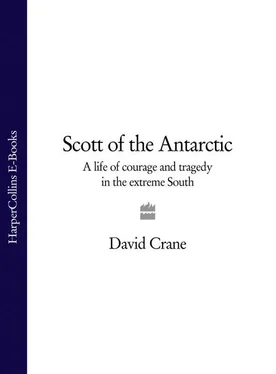If there is again as much Barrie as Scott in this, the family collapse does provide the first real insight into the qualities that distinguished the mature man. In his later years he could talk about ‘duty’ and ‘patriotism’ with the best of them, but whether it was to ship, colleagues, service or country, Scott’s sense of loyalty and duty was always rooted in real obligations, affections, ties and responsibilities. And at the heart of this nexus of relations was his family, and above all his mother. There is a species of family feeling that is little more than an enlarged and clannish selfishness, but as with his ambition there was nothing narrow or ‘laager-like’ in Scott’s devotion, only a generous and unpossessive openness to their sorrows, happiness and opportunities.
In her memoir of her brother Con, Grace described his facility for appearing to be absorbed in the person he was talking to, but his letters to his family reveal a much profounder and more genuine empathy than that remark suggests. It is one of those aspects of personality that is always going to elude definition, but there seems to have always been something almost Keatsian in Scott’s capacity for submerging his own identity and ‘absorbing’ himself – Grace’s word – in the fragile, anxious interior lives of a mother, brother or sister.
As his subsequent career in the Antarctic – and in particular his response to human or animal suffering – would underline, the barriers between ‘self’ and ‘other’ would never be very firmly established for Scott, and never was this more true than when his family needed him. There was nothing he actually ‘did’ for them during their troubles that Archie or Ettie did not match, but in terms of understanding and explaining, and interpreting one to another, he was central to their recovery.
With his mother, in particular, he needed all his tact and sympathy to nudge and cajole her into accepting the different world the Scotts found themselves in with financial failure. Some time towards the end of 1895 or 1896 John Scott secured a job as manager of a Somerset brewery, and while it brought a house and some financial stability, the descent back into trade left Hannah Scott more rawly exposed than ever to the indignities of her position. There can have been no escaping it, either, because even the transition from the rich Devon landscape to the mean, straggling village of Holcombe offered a Hardyesque mirror to their fortunes. Under the fields around the old perpendicular church of St Andrew’s lay buried the ancient pre-plague village, but it was the great mass of the Holcombe Brewery that dominated the new village, with its miserably ugly church, its Wesleyan chapel, its vestiges of the old coal industry and its brewery employees, defining the physical and social perimeters of the Scott family’s decline.
There had been nothing in the bourgeois, provincial, Godfearing, servant-padded world in which Hannah Scott had lived the first sixty years of her life to prepare her for this, and nothing her son would not do to protect her from it. In his memoir of Scott, Barrie spoke feelingly of his hardships at this time, but whatever the humiliations of tarnished braid or a threadbare uniform for a naval officer of Scott’s stamp, he felt the family’s poverty more keenly for his mother than himself. ‘I hate to think that you did not go and see her before she left,’ he wrote to her at Holcombe after Ettie had left for the stage. ‘I hate to think I had not the forethought of writing to urge you to go – that you should have studied economy in such a matter makes me feel very bitter – Promise you won’t do it again – but you really shan’t, for when she comes back I am determined you shall go and see her act and shall yourself see the life and some of your many unknown admirers (who have seen your picture only). I can’t forgive my own want of forethought in not writing about it … I have another great fear about you dear, which is that you don’t get any society. – I do hope people will come & call – you don’t speak of any as yet. I rather feel that people round you are not inclined that way and that you are having rather a slow time – But I suppose time only can correct this and the gradual appreciation of how nice you really are.’
For all Scott’s chivalry, there was nothing emasculating in his devotion to his mother, and while she always remained at the centre of his loyalties, that never stopped him fighting his sisters’ corners when they needed him. ‘Dear Mother,’ he wrote in the same letter to Holcombe, ‘I am afraid that you must be grieving over Ettie’s absence very much, but think dear what it means to her. What prospects of independence and the pleasure of really living, working & doing.’
‘My Own Dearest Mother,’ he wrote in the same vein, this time of Kate and Grace’s new lives as working women, ‘You cannot think how delightful it was to find you all in such good health and spirits. The prospect for the future seems brighter than it has been for years and above all things I rejoice to see that you are beginning to appreciate that by this honest hard work the girls are anything but sufferers. The difference in them since they have been about, meeting all manner of people and relying on themselves, is so very plain to me. Just the same sort of difference that Ettie felt and valued so much. They have gained in a hundred points, not to mention appearance and smartness. I honestly think we shall some day be grateful to fortune for lifting us out of the “sleepy hollow” of the old Plymouth life. Personally, I cannot express the difference I see in the girls since their London experiences.’
For a few brief months in the mid-1890s it must have seemed that he was right, and home on leave at Christmas 1896, the two brothers took up where they had left off in their rented farm. A ‘mixed entertainment and fine farce called Chiselling’ was put on for the brewery’s workers and customers, the local paper reported. ‘Lt A Scott RA. Lt R Scott RN and the Misses K and M. Scott of Holcombe House [were] extremely funny … continuous roars of laughter.’
It was no more than a last, poignant codicil to the family’s collapse, though, and within twelve months both John Scott and his younger son, ‘Arch’, were dead. It seems somehow appropriate that the last public glimpse of John Scott is of him being pushed in a wheelchair to his daughter Ettie’s wedding, but while his death from heart disease cannot have been a complete shock, or even blow, to his family, nothing had prepared them for Arch’s.
‘I am longing to see old Arch,’ Scott had written in the summer of 1897, ‘and tell him how hopeful I think it all,’ and the following year he got his wish. Arch, home on leave from Lagos, joined him, with the use of the admiral’s spare cabin, for a cruise off the Irish coast in Scott’s ship to thrash out the details of the family’s finances. ‘My dearest girl,’ he wrote to his sister Ettie, ‘Arch has been staying with me for the last few days, he is in great form & looking very well – we have of course talked matters out & I think arrived at a clear understanding as regards the situation.’ ‘Isn’t Arch just splendid,’ he wrote to his mother on 15 October. ‘He is so absolutely full of life and enjoyment and at the same time so keen on his job. I expect he has told you about his hope of becoming a commissioner. He seems to have done most excellent work and shown tact and energy in an extraordinary degree. Dear old chap, he deserves to be a success – Commissioner, Consul, and Governor is the future for him I feel sure.’
Within a month, Arch was dead. He had gone to Hythe to play golf, and went down with typhoid. Just what the news meant to Scott can be felt in his letter to Ettie. ‘My dearest Girl, It is good to hear there was no pain and it is easy to understand that he died like a man. All his life, wherever he went, people felt the better for his coming. I don’t think he ever did an unkind thing and no form of meanness was in him. It is a strange chance that has taken him who perhaps of us all found the keenest pleasure in life, who was always content and never grumbled. Of course, now we know he never ought to have gone to West Africa. After watching him carefully, I saw that despite his health he was not strong and I meant to have a long talk with you on the subject. Too late – doesn’t it always seem the ending of our wretched little mortal plans? Good God, it is past all understanding. He and you and I were very close together, weren’t we? I know what your loss is, knowing my own.’
Читать дальше












![John Bruce - The Lettsomian Lectures on Diseases and Disorders of the Heart and Arteries in Middle and Advanced Life [1900-1901]](/books/749387/john-bruce-the-lettsomian-lectures-on-diseases-and-disorders-of-the-heart-and-arteries-in-middle-and-advanced-life-1900-1901-thumb.webp)